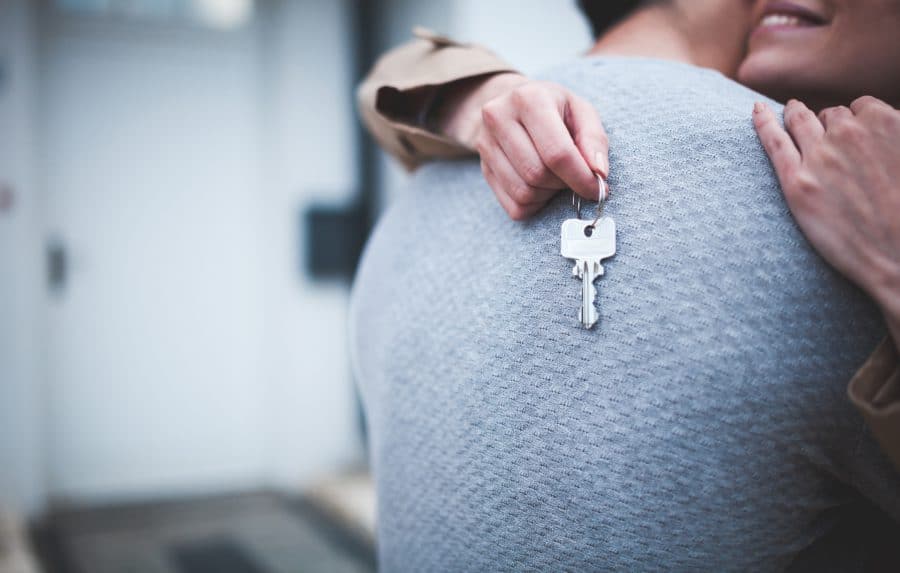CPN Housing Director Scott George has seen it all through nearly three decades of working in tribal housing programs across Oklahoma. Going back to his experiences as a grant writer for the Sac and Fox Nation’s Housing Authority to his current role, George is an eyewitness to many well-intentioned housing plans for tribal nations that have gone awry.
One such example was a mutual help program where a tribal housing office would build a home for a tribal member who put sweat equity into it. This “sweat equity,” which consisted of cleaning up after the builders or finishing the painting, counted as the homeowner’s down payment. The homeowner was then responsible for monthly payments on a 25-year mortgage based on their income.

“The flaw was that the monthly payment had no ceiling,” George said in a 2015 Hownikan interview. “So if your income went up, so did your payment. People got discouraged because they couldn’t save money up and get ahead even if they got better jobs. Some of them quit working and just met the $25 minimum monthly payment.”
Yet tribal housing programs across the country continue to adapt and create programs that work for the people in their immediate communities.
Along with his staff, George believes the new Home Purchase Mortgage Buy-Down Program will provide opportunities for homeownership to qualifying CPN members where previous initiatives may not have worked.
By combining grant funds from Indian Housing Block Grants with private mortgages, the housing department sees a chance to provide funding for a wider array of homes available for Citizen Potawatomi. After careful consideration and research, the housing department believes they have found a way to assist low-income Native American households with high creditworthiness in the CPN jurisdiction with the purchase of a home.
“Essentially, we want to provide Tribal members living in the CPN jurisdiction affordable homeownership financing opportunities that will ultimately help the quality of life in our communities,” said CPN Home Ownership Manager Sherry Byers.
For those who use the program, its funds can help reduce a purchase price on an existing home located anywhere in the CPN’s historic jurisdiction in Oklahoma. Prior Tribal housing programs have provided housing using existing stock held by the Nation. The Home Purchase Mortgage Buy-Down Program will offer funding for all qualifying homes in the area’s housing market.
If the Tribal member’s lender agrees to the mortgage buydown funds, the results for the borrower will be an overall lower mortgage amount owed.
“In practical terms, that’s a lower monthly payment,” Byers said.
Borrowers can utilize the One Time Grant Program, which pays toward closing costs or down payments, in conjunction with the Home Purchase Mortgage Buy-Down Program.
The grant is available to all eligible Native American households who qualify and reside within CPN’s jurisdiction; however, a first preference for Citizen Potawatomi is given. The maximum amount of assistance available for each homeowner is $20,000 for homes with a purchase price exceeding $60,000. For homes under $60,000, the grant will cover up to 25 percent of the purchase price. All CPN homeownership programs are subject to U.S. Housing and Urban Development rules and regulations, meaning the household must meet low-income limits and fulfill all requests for information from the CPN Housing Department.
George and Byers estimate that this year’s program can serve up to 20 households, with only one qualifying individual per household eligible for the program.
“This means we can’t have a mom, her adult child and grandma all apply, even if they live in the same home,” George said.
The program will be rolled out on Oct. 1, 2019, and the funds are only eligible for homes being purchased after this date.
In order to ensure a proper return on the investment of Tribal and federal funds, there are requirements for the Home Purchase Mortgage Buy-Down Program. The property cannot be a mobile or manufactured home, and it must be the primary residence of the owner. It must pass a housing quality standards home inspection, paid for by the purchaser, and no felons can reside in the property. The funds are not available for refinancing of existing mortgages, and funding must come from a reputable financial lending institution. Any home using the program’s funds must meet CPN and HUD’s environmental criteria as well.
Additionally, once purchased, it must remain the primary residence for 10 years, with the program having strict resale restrictions.
“This way, we can ensure that these funds aren’t being used to flip homes but are being utilized for their express purpose of housing our Tribal members,” Byers said. “If the applicant chooses to sell or transfer the home within that 10 years, the program must be repaid in full.”
To learn more about this or other housing programs, please contact Sherry Byers at 405-273-2833 or sbyers@potawatomi.org, or visit cpn.news/housing.
For information regarding loan products and lending requirements at Citizen Potawatomi Nation-owned First National Bank & Trust Co., please contact Jeff Scroggins, mortgage loan officer, at 405-275-8830 or 1-800-227-8362. To learn more about FNB, please visit fnbokla.bank.
